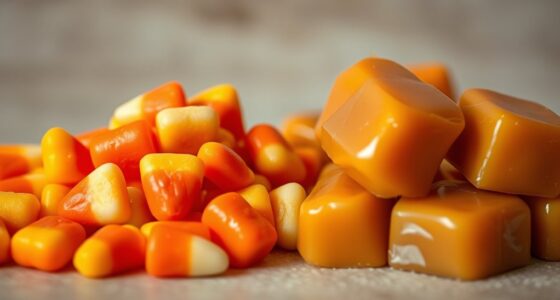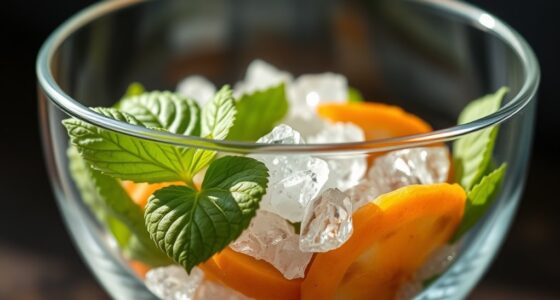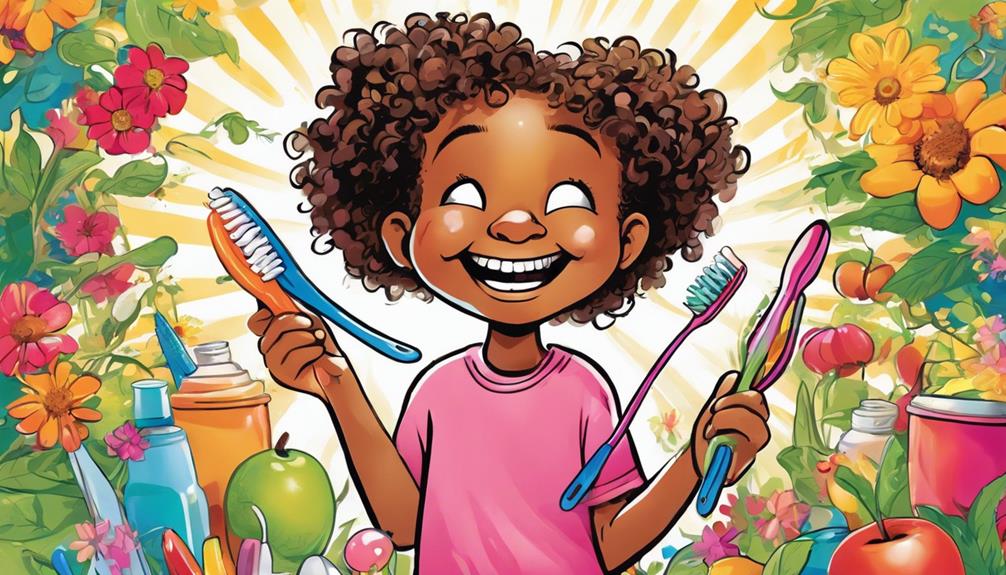To promote healthy saliva flow, stay consistently hydrated by drinking water throughout the day and carry a refillable bottle. Incorporate hydrating foods like fruits and veggies, chew sugar-free gum to stimulate saliva, and use mouth rinses after meals. Avoid caffeine and alcohol that dry out your mouth, practice nasal breathing, and check your medications with your healthcare provider. Keep up good oral hygiene habits—if you want to learn more tips, you’ll find useful strategies ahead.
Key Takeaways
- Drink water regularly throughout the day and use hydration tracking tools to maintain optimal fluid intake.
- Consume high-water-content foods like fruits and vegetables, such as watermelon, cucumbers, and oranges.
- Chew sugar-free gum or rinse with flavorful, alcohol-free mouthwash to stimulate saliva production.
- Limit dehydrating substances like caffeine and alcohol, and consult healthcare providers about medications that dry the mouth.
- Practice nasal breathing and deep breathing exercises to promote overall hydration and oral moisture.
Stay Hydrated Throughout the Day
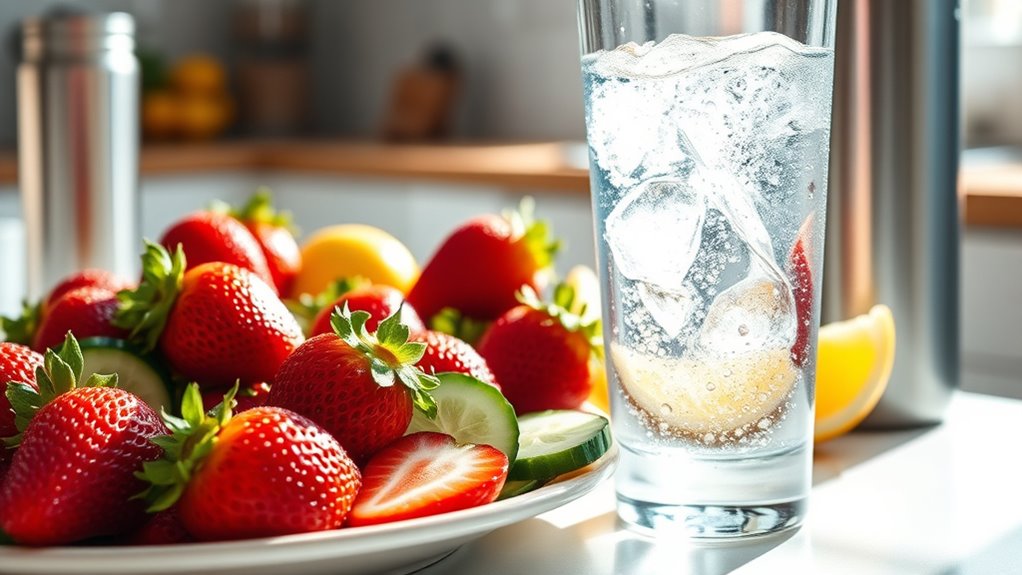
To stay properly hydrated throughout the day, you need to drink water consistently rather than waiting until you’re thirsty. Hydration tracking can help you stay aware of your intake, making it easier to meet your daily goals. Set specific times for water intake scheduling—like drinking a glass every hour or after certain activities—to build a routine. Carry a refillable water bottle with you to remind yourself to sip regularly. Using reminders or apps can also boost your consistency. Remember, steady hydration supports saliva flow and overall health. By staying mindful of your hydration habits, you’ll prevent dehydration and keep your mouth moist, reducing discomfort and promoting better oral health. Consistent water intake is your best strategy for staying well-hydrated all day long.
Incorporate Hydrating Foods Into Your Diet
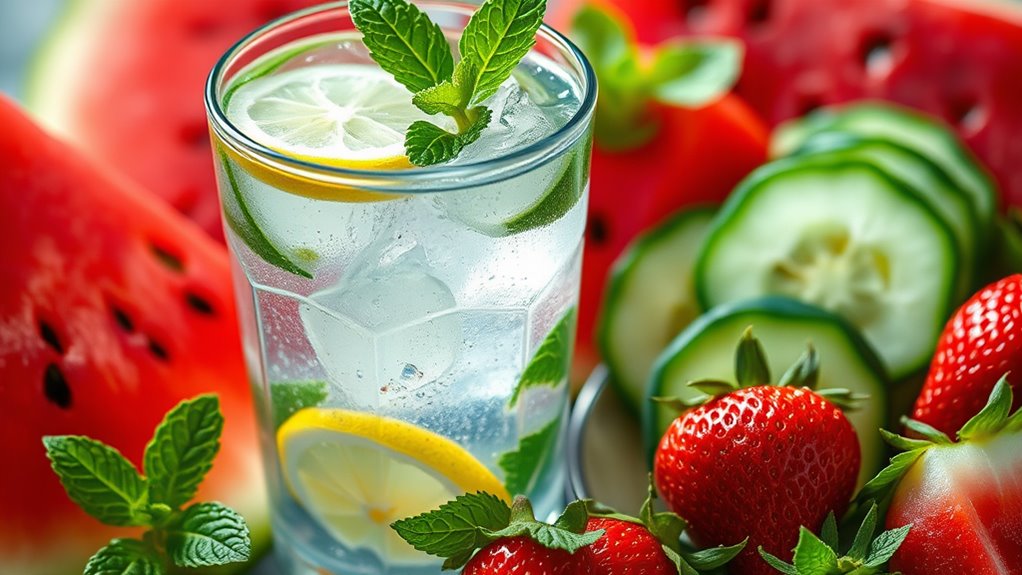
Adding hydrating foods to your meals is an easy way to boost your fluid intake. Opt for fresh fruits like watermelon or berries, and include juicy vegetables such as cucumber or bell peppers. Snack on ideas like sliced fruit, veggie sticks, or chilled grapes to stay refreshed throughout the day. Incorporating color accuracy into your diet can also help improve overall well-being, as it reflects the importance of balanced nutrients for skin and tissue health.
Fresh Fruit Choices
Incorporating fresh fruits into your diet is an easy way to boost hydration, as many fruits naturally contain high water content. Tropical fruits like pineapple, mango, and papaya are not only delicious but also provide significant hydration, helping keep your saliva flowing. Citrus options such as oranges, grapefruits, and mandarins are packed with water and vitamin C, making them excellent choices for hydration and oral health. Eating these fruits regularly can help maintain moisture levels in your mouth, especially when you’re feeling dry. Plus, their natural sugars and antioxidants support overall wellness. Growing chia seeds indoors can be a sustainable way to ensure a fresh supply of hydrating fruits and seeds year-round. Incorporate a variety of these hydrating fruits into your snacks or meals for a tasty, effective way to promote healthy saliva flow and stay refreshed throughout the day.
Juicy Vegetable Options
Juicy vegetables are a fantastic way to boost your hydration naturally. They provide essential moisture and nutrients that support healthy saliva flow. Leafy greens like spinach and lettuce are packed with water and easy to incorporate into salads or sandwiches. Crunchy vegetables such as cucumbers, celery, and bell peppers offer high water content and satisfying texture. Including a variety of these in your diet keeps you hydrated and promotes oral health. Proper decoherence of natural materials in your meals can enhance the effectiveness of hydration efforts. Here’s a quick look at some hydrating vegetables:
| Vegetable | Water Content (%) | Best Use |
|---|---|---|
| Cucumber | 95 | Snacks, salads |
| Celery | 95 | Dips, snacks |
| Spinach | 91 | Salads, smoothies |
| Bell Peppers | 92 | Raw, stir-fries |
Hydrating Snack Ideas
To stay hydrated and satisfy your snack cravings, choose foods that are naturally high in water content. Fruit smoothies are an excellent option, combining juicy fruits like watermelon, berries, or oranges with yogurt or coconut water for extra hydration. These drinks not only quench your thirst but also boost your saliva flow. Nut butters, such as almond or peanut butter, pair well with hydrating fruits or are great spread on moist whole-grain bread, providing healthy fats and moisture that support saliva production. Incorporating these snacks into your diet keeps you refreshed and promotes healthy saliva flow. Opt for fresh, hydrating foods whenever possible, and enjoy snacks that nourish your body and keep you feeling moist and comfortable throughout the day.
Choose Sugar-Free and Sugarless Chewing Gums

Choosing sugar-free or sugarless gums can help keep your mouth moist and promote hydration throughout the day. These gums also support oral health by reducing the risk of cavities and decay. Plus, they offer an invigorating way to boost saliva production without added sugars. Using sugar-free gum can also contribute to overall oral health benefits by decreasing harmful bacteria in the mouth.
Sugar-Free Gums Benefits
Sugar-free gums offer several health benefits, making them a smart alternative to sugared varieties. When you choose sugar free gums, you not only satisfy your oral cravings but also promote better saliva flow. The chewing benefits help stimulate saliva production, which keeps your mouth moist and supports hydration.
Here are four key advantages:
- Reduces cavity risk by avoiding sugar that feeds harmful bacteria.
- Freshens breath naturally without added sugars.
- Supports saliva flow, aiding in hydration and oral comfort.
- Helps curb cravings for sugary snacks, promoting healthier choices.
Oral Health Boost
Opting for sugar-free or sugarless gums can substantially enhance your oral health. Many hydration myths suggest that chewing gum isn’t beneficial, but choosing the right type can stimulate saliva production, which is essential for maintaining healthy teeth and gums. Chewing gum increases saliva enzymes that help neutralize acids and wash away food particles, reducing the risk of cavities and decay. Unlike sugared gums, sugarless options prevent harmful bacteria growth that leads to plaque buildup. This simple habit also promotes better hydration by encouraging saliva flow, which keeps your mouth moist and fresh. Additionally, oral health benefits of sugar-free gum extend to freshening breath and preventing dry mouth, making it a versatile choice. By incorporating sugar-free gum into your routine, you support your oral health while debunking hydration myths that suggest all gum is harmful. It’s a quick, effective way to boost saliva and protect your smile.
Use Mouth Rinses to Stimulate Saliva Production
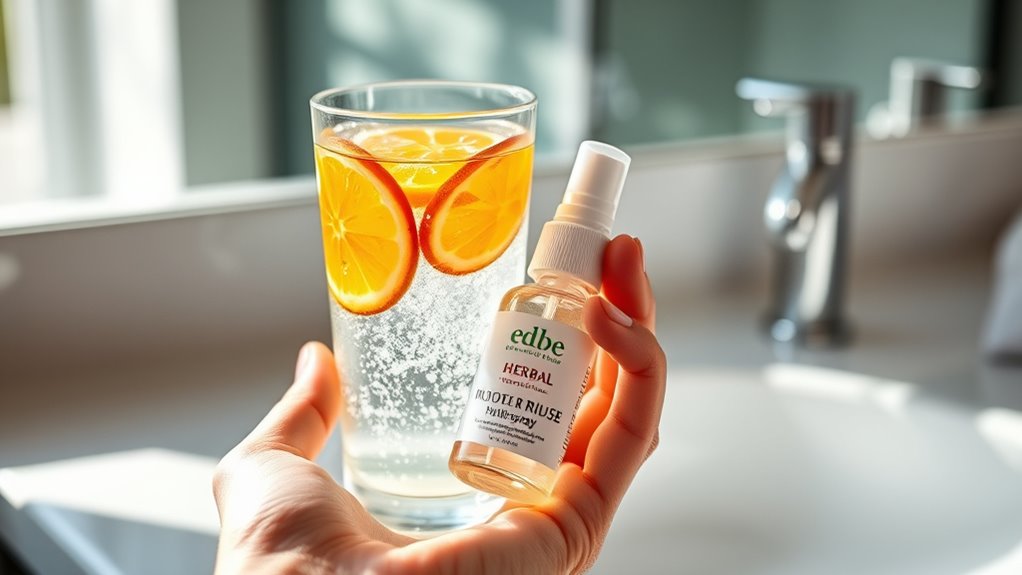
Using mouth rinses can be an effective way to stimulate saliva production, especially when your mouth feels dry or sticky. Flavor enhanced rinses add a pleasant taste that encourages regular use, boosting your saliva flow. Alcohol free mouthwashes are gentler and won’t dry out your mouth further. To get the best results, try these tips:
- Rinse with a flavor enhanced mouthwash after meals to promote saliva stimulation.
- Use alcohol free mouthwashes to avoid dehydration.
- Swish for 30 seconds, allowing the rinse to coat your oral tissues.
- Choose mint or citrus flavors for extra refreshment and stimulation.
Incorporating these rinses into your routine can help keep your mouth moist and promote overall oral health.
Avoid Caffeine and Alcoholic Beverages
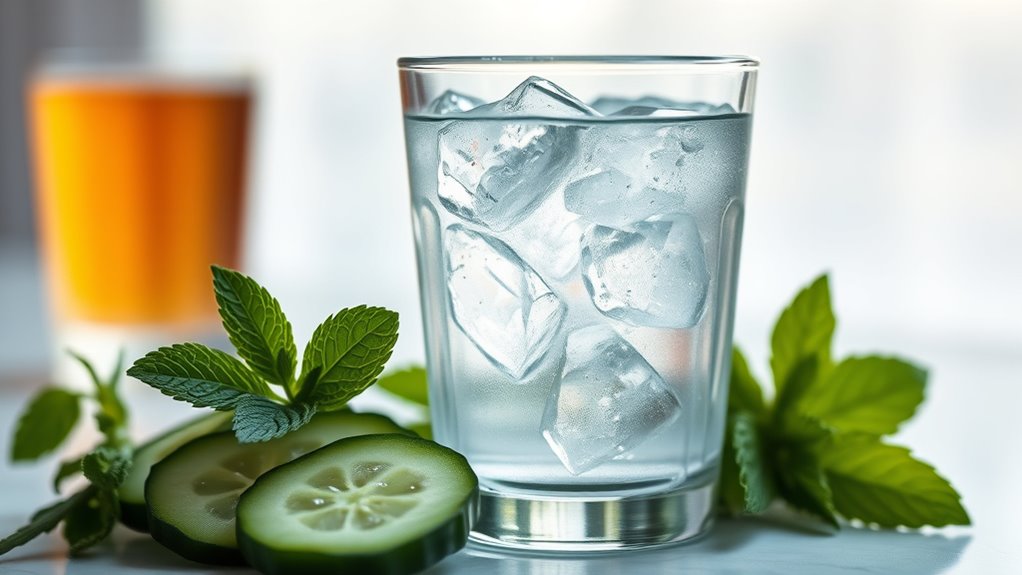
Caffeine and alcoholic beverages can quickly dehydrate your body, making it harder to maintain proper hydration. Caffeine effects include increased urine production, which can lead to dehydration if consumed in excess. Alcohol dehydration occurs because alcohol suppresses the release of antidiuretic hormone, causing your body to lose more water. When you drink these beverages, you might feel temporarily alert or relaxed, but they actually work against your hydration goals. To support healthy saliva flow, it’s best to limit or avoid caffeine and alcohol altogether. Instead, opt for water or herbal teas that hydrate without causing dehydration. Staying well-hydrated helps your saliva stay balanced, reducing dryness and maintaining oral health. Additionally, understanding the importance of Gold IRA Rollovers can be a strategic move for securing your financial future while focusing on overall well-being.
Practice Proper Breathing Techniques

Practicing proper breathing techniques can considerably enhance your hydration efforts by ensuring your body maintains ideal oxygen levels and reduces unnecessary water loss. When you focus on nasal breathing, you promote better moisture retention in your mouth and throat. Incorporate these simple steps:
- Use breathing exercises to regulate your breath and promote calmness.
- Breathe deeply through your nose, not your mouth, to preserve oral moisture.
- Practice diaphragmatic breathing to improve oxygen intake and reduce dry mouth.
- Consistently remind yourself to breathe slowly and evenly, especially during stressful moments.
- Developing a methodical approach to your breathing can help maintain consistent hydration and overall wellness.
Limit Drying Medications and Consult Your Dentist

Medications with drying side effects can substantially decrease saliva production, leading to dry mouth and increased dehydration risk. If you’re taking such medications, talk to your healthcare provider about possible alternatives or dosage adjustments. It’s also essential to inform your dentist during regular checkups, as medication side effects can impact your oral health. A dentist consultation can help identify if your dry mouth is related to medication use and recommend strategies to manage it. Avoid stopping medication without professional guidance, but explore options that minimize dehydration. Being proactive about medication side effects helps preserve saliva flow, reducing discomfort and the risk of dental issues. Staying informed and working with your healthcare team ensures you maintain adequate hydration and oral health. Recognizing the symptoms of dry mouth early can facilitate timely interventions and improve overall well-being.
Maintain Regular Oral Hygiene Practices
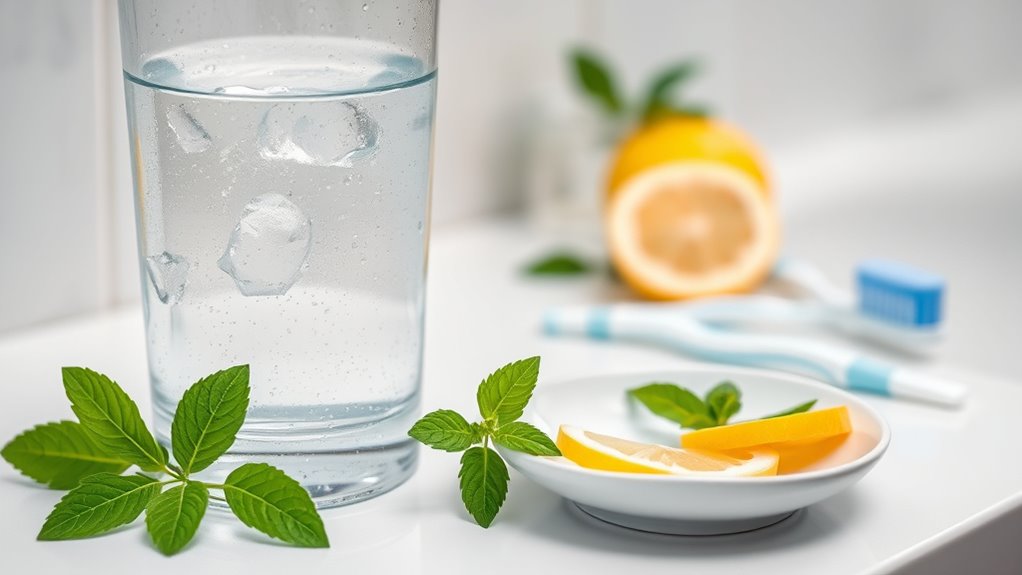
Maintaining regular oral hygiene is essential for keeping your mouth healthy and preventing dehydration-related issues. Proper oral hygiene routines help preserve the saliva pH balance, which is vital for overall mouth health. To enhance your practices, consider these steps:
Consistent oral hygiene maintains mouth health and supports saliva pH balance, helping prevent dehydration and dryness.
- Brush your teeth twice daily with fluoride toothpaste to remove bacteria and debris.
- Floss daily to clean between teeth and prevent plaque buildup.
- Use an alcohol-free mouthwash to refresh your mouth and support saliva production.
- Stay consistent with your routine to maintain ideal saliva pH levels and reduce dryness.
Frequently Asked Questions
Can Dehydration Cause Chronic Dry Mouth?
Dehydration causes dry mouth because it leads to a decline in saliva production. When you don’t drink enough water, your body conserves moisture, resulting in less saliva. This can cause persistent dry mouth, making it uncomfortable and increasing the risk of oral health issues. To prevent this, stay well-hydrated, especially if you notice your mouth feeling dry. Proper hydration supports healthy saliva flow and keeps your mouth moist.
Are There Specific Herbal Teas That Boost Saliva Flow?
You might wonder if certain herbal teas can boost saliva flow. Some herbal tea benefits include incorporating saliva stimulating herbs like chamomile, ginger, and licorice root. These herbs are known for their natural ability to promote saliva production, helping combat dry mouth. Drinking these teas regularly can keep your mouth moist and healthy. Just choose herbal teas with these specific herbs to enjoy their saliva-stimulating effects and support your oral health naturally.
How Does Age Affect Saliva Production?
As you age, your saliva production naturally decreases, affecting saliva enzymes essential for digestion and oral health. This decline can lead to dry mouth and increased risks for cavities and gum issues. You might notice a drier mouth, but staying hydrated and maintaining good oral hygiene can help support your aging oral health. Regular dental checkups ensure your saliva flow stays as healthy as possible, even as you grow older.
Can Stress Impact Saliva Levels?
Did you know that stress can decrease saliva production by up to 40%? When you’re stressed, your body releases hormones that inhibit saliva flow, leading to dry mouth. To combat this, stress management techniques like deep breathing or meditation can help stimulate saliva production naturally. Incorporating saliva stimulation exercises, such as chewing sugar-free gum, also supports healthy saliva levels. Managing stress is key to maintaining proper oral health and hydration.
Are There Natural Supplements for Improving Saliva Production?
You might wonder if natural supplements can boost saliva production. Herbal supplement benefits include ingredients like marshmallow root, slippery elm, and licorice root, which can help soothe your mouth and stimulate saliva flow. Dietary enhancement tips also include staying well-hydrated and eating crunchy fruits or vegetables. These natural options are gentle, safe, and effective ways to support healthy saliva levels, especially when combined with good hydration habits.
Conclusion
Think of your saliva as a gentle river keeping your mouth fresh and healthy. By staying hydrated, choosing the right foods, and practicing good habits, you can keep this river flowing smoothly. Avoiding drying drinks and medications also helps prevent a drought in your mouth. Remember, you’re the gardener of your oral health—tend to it daily, and your saliva will thrive, leaving your smile bright and your mouth feeling refreshed.


